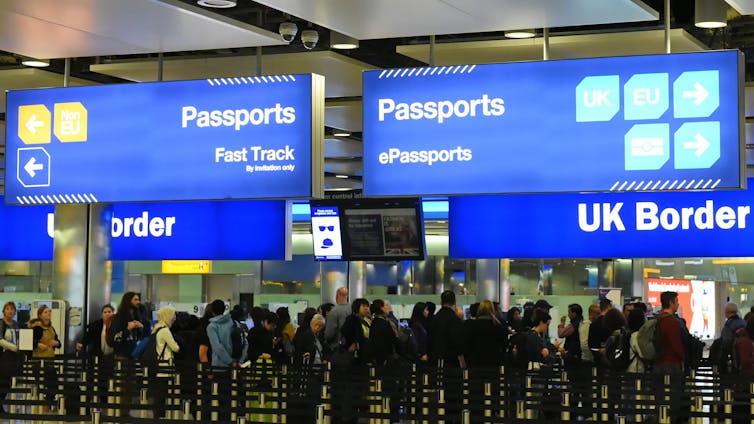Opinion | Friday, 16th November 2018
Theresa May’s deal is almost exactly the Brexit the UK voted for
Dr Craig Berry gives his opinion on the latest Brexit development
Originally published on The Conversation
by Dr Craig Berry, Reader in Political Economy at Manchester Metropolitan University
Forgive me, I may have missed something. There has of course been a lot to take in over the last few days. But, despite what the latest former Brexit secretary believes, it seems to me that the Brexit withdrawal agreement delivers almost exactly what the UK voted for in June 2016.
The reasons 17.4m people voted to leave the EU were multiple, complex and, in part, contradictory. But it is beyond doubt that a desire to control immigration was the most important reason. The evidence in this regard is overwhelming.
There is of course a need to understand why immigration became such an important concern for many voters (I blame austerity, in terms of both its material impact and the conservative ideas it normalised). Nevertheless, for the moment, the Brexit deal delivers on this agenda.
Yet Dominic Raab and Esther McVey’s resignation letters make no specific reference to immigration. They note more vaguely that the Brexit deal betrays “the promises we made to the country”, or “does not honour the result of the referendum”.

There is some evidence to suggest that the slippery notion of sovereignty mattered for many voters, after immigration. “Take back control” was, after all, the key mantra of Vote Leave. But few people think in such abstract terms. The control people wanted to take back – the sovereignty that mattered – was over the UK’s borders.
May’s deal
The great irony of Theresa May’s current predicament is that only she, on the government benches, really seems to grasp this basic political reality. May is far closer to the core of public opinion – or at least the 2016 snapshot – than either the hard Brexiteers or the Tory remainers, as the deal she has agreed with the EU clearly demonstrates.
Although May supported Remain, principally because she understood the economic damage that Brexit would inflict, the author of the Home Office’s “hostile environment” agenda has always been an opponent of immigration.

The deal addresses the status of existing EU migrants and contains some specific arrangements in Northern Ireland related to preventing a hard border on the island of Ireland – but there is little to suggest that the UK has been compelled to accept the continued free movement of labour. The seven-page political declaration outlining the future relationship with the EU, published alongside the 585-page deal, includes only 35 words on the mobility of people between the UK and EU. It emphasises that temporary mobility will be allowed “for business purposes in defined areas”, with “visa-free travel for short-term visits”.
In other words, Dutch bankers and French chefs will remain welcome. Bricklayers from eastern European accession countries: not so much.
Trade realities
In the long run this position cannot hold. If the UK wants to have a free trade deal with the EU that gets anywhere close to the market access enjoyed by, for instance, non-EU members of the European Economic Area or European Free Trade Association such as Norway and Switzerland, free movement is going to have to come back on the table. So, while the deal reflects what the country voted for in 2016, it is still deceitful in the sense that it is probably undeliverable.
That said, to even secure from the EU the implicit agreement that the “four freedoms” (the unhindered movement of goods, services, capital and people) are divisible after all, is a remarkable achievement by the May government. Or, more likely, it is a sign that the continuing members of the EU are, increasingly, led by governments who share May’s anti-immigration perspective.
Either way, it is the other three freedoms – trade policy, rather than immigration – which seem to be motivating the Brexiteers campaigning against May, despite the lack of evidence that this issue played a significant role in the leave vote.
They are correct in their criticism of May’s deal that it removes any likelihood that the UK will enjoy trade policy autonomy in the near future. At the same time, their opposition to May’s deal is logically inconsistent with their own argument that May has underplayed the UK’s hand. The trade negotiations that will now ensue, if parliament accepts the withdrawal deal, is their chance to prove that the EU does need the UK just as much as the UK needs the EU – and that it’s possible for the UK to secure long-term access to EU markets without undermining its trade policy autonomy.
Yet the resignations of Raab and McVey, and the earlier resignations of Boris Johnson and David Davis, jeopardise this opportunity. Raab’s letter states that the trade policy constraints implied by the Northern Ireland backstop mechanism are now “the starting point for negotiating the Future Economic Partnership. If we accept that, it will severely prejudice the second phase of negotiations against the UK”.
This is, plainly, nonsense. The “best of both worlds” trade deal the Brexiteers have been promising for more than two years would have overridden all of the transitional and backstop arrangements. Raab may have left May’s government, but by pretending that the withdrawal agreement will undermine our ability to forge a new trade relationship with the EU he is accepting that the UK’s position is not nearly as strong as previously claimed – and therefore reinforcing the rationale for May’s apparent capitulation.
May’s premiership might look like a mess, but I think she will be judged more kindly by history than it appears at the moment. The early decisions to rule out a second referendum and forgo a cross-party approach to negotiations will of course be seen as catastrophic errors of judgement. She paid the price with the loss of her parliamentary majority at the 2017 general election.
But she has been rather successful, since then, at clawing out of the hole she dug for herself – and indeed delivering on her primary policy objective and the preferences expressed by the public in 2016.
How history will judge those now seeking to replace May, despite the palpable lack of any alternative plan for EU withdrawal, is quite another matter.




